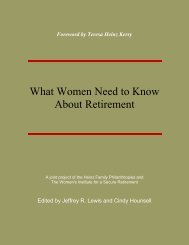What Women Need to Know About Retirement - Wiser
What Women Need to Know About Retirement - Wiser
What Women Need to Know About Retirement - Wiser
You also want an ePaper? Increase the reach of your titles
YUMPU automatically turns print PDFs into web optimized ePapers that Google loves.
WISER FACT SHEET<br />
10 Questions <strong>to</strong> Ask Before You Buy Long-Term Care Insurance<br />
1. Does the policy include protection against inflation?<br />
The benefits paid by the policy should increase with the rate of inflation; otherwise, your<br />
policy may be worth very little by the time you want <strong>to</strong> use it.<br />
2. Does the policy guarantee that premiums remain level?<br />
If you bought your policy at age 60, the insurance company will always charge you the same<br />
rate as other 60-year old policyholders. Once you buy the policy, the company can’t raise<br />
your rates because of your age (but it can raise rates for an entire class of insured<br />
individuals). Some policies guarantee that the rate will not change for a specific period of<br />
time.<br />
3. Does the policy cover home health care benefits and all levels of nursing home<br />
care including skilled, intermediate and cus<strong>to</strong>dial care?<br />
Classic policies cover nursing home care and can have a rider <strong>to</strong> cover home health care.<br />
Integrated policies provide a pool of funds that can be used for a range of long-term care<br />
services.<br />
4. Does it provide comprehensive benefits for both home care and nursing home<br />
care?<br />
Make sure that the policy covers less severe impairments and provides services that help you<br />
remain in your home.<br />
5. Is the policy renewal guaranteed?<br />
Policies that qualify for federal tax deductions must have the renewal guaranteed, meaning<br />
that the policy cannot be canceled if you pay the premiums on time. Other policies are<br />
conditionally guaranteed and the company could cancel coverage for a group but not for you<br />
as an individual member of the group.<br />
6. Is the maximum benefit period one year or more?<br />
The benefit period can vary from one year <strong>to</strong> a lifetime. You may also be able <strong>to</strong> choose <strong>to</strong><br />
have coverage for a maximum number of days or maximum amount of benefits paid.<br />
7. Is the deductible affordable and does the policy have a waiting period of 100<br />
days or less?<br />
The deductible period is also called the waiting or elimination period. Most policies require<br />
that you pay for needed care from your own money for a certain number of days before the<br />
policy starts <strong>to</strong> pay for the services.<br />
8. Once approved for coverage, will the policy cover pre-existing conditions or<br />
limit coverage for certain conditions?<br />
Some policies exclude preexisting conditions, or certain diseases like Alzheimer’s disease.<br />
Since Alzheimer’s is a major reason for nursing home admissions, make sure you know if<br />
your policy will cover you or your spouse if you develop Alzheimer’s disease.<br />
48




